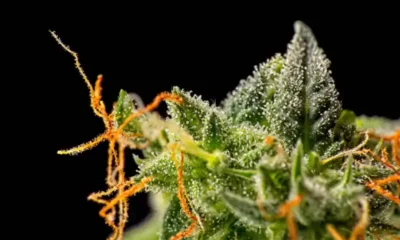Connect with us
Published
1 year agoon

Cannabis is known to be beneficial in treating symptoms associated with myriad health conditions. As we continue learning more about the benefits of this plant medicine, a new study finds that cannabis could have a significant impact on quality of life for women with fibromyalgia. The study was published earlier this month in the journal Pain Practice.
Fibromyalgia is a complex, chronic condition characterized by widespread musculoskeletal pain, often causing a range of debilitating symptoms like high sensitivity to pain, muscle stiffness, fatigue, along with sleep, memory and mood issues. It is often triggered by an event that causes physical or emotional stress, like a serious injury, an infection, a major operation or experiencing significant emotional trauma, though fibromyalgia doesn’t always develop after an obvious trigger.
Fibromyalgia affects approximately one in 20 people to some degree, though estimates vary since the condition is often difficult to diagnose. Anyone can develop fibromyalgia, though it is more common in women than in men.
There is no cure for fibromyalgia, and it’s often hard to treat. Rather than getting to the root causes, doctors often rely on masking symptoms with prescription drugs, like opioids and antidepressants, to provide patients relief.
Authors note previous studies, finding that cannabis can effectively promote sleep, deepening and lengthening the sleep cycle and good pain relief, when compared with SSRIs and SNRIs. Using the World Health Organization Quality of Life Bref questionnaire, researchers sought to characterize the impact of initiating cannabis treatment in women with treatment-resistant fibromyalgia.
Researchers examined the impact of cannabis on the quality of life in 30 women, aged 18 to 70 years old, with treatment-resistant fibromyalgia. The women were asked to mark improvement in general quality of life, general health, physical and psychological health after 30 days of treatment. The participants had exhausted other treatments and started cannabis treatments, and pregnant women were excluded.
Ultimately, researchers found that 30 days of cannabis treatment marked an improvement in all measured aspects. The study also notes that financial resources and home environment were not influenced by cannabis treatment among participants.
“Results suggest a potentially significant role of Cannabis in treatment-resistant Fibromyalgia women,” authors concluded. “Early Cannabis treatment may result in a beneficial short-term effect on the quality of life through its influence on pain, sleep, and physical and psychological domains.”
In closing, the authors point to the need for further studies to understand the potential of cannabis in treating fibromyalgia, along with its long-term benefits.
While the study helps provide a bit more clarity and opens more doors for future research, it’s certainly not the first time scientists have looked into the therapeutic benefits cannabis could offer those with fibromyalgia. Namely, many people with fibromyalgia have already made the switch from prescription meds and opioids to plant medicine on their own.
Last year, researchers at the University of Michigan’s school of medicine conducted a study and found that 70% of fibromyalgia patients who used CBD substituted it for opioids or other pain medications. This group said they either decreased use or stopped taking their previous medications altogether as a result.
Another 2021 study similarly found that more than one-third of 1,382 women surveyed were current CBD users; among the group, 81% reported improved pain symptoms after their CBD use, and 76% said they were able to substitute CBD for other medications.
While these studies focused on CBD, researchers said the results were promising, especially if the non-psychoactive cannabinoid could provide similar relief as THC.
Previous studies have also similarly concluded that medical cannabis can help with symptom relief, including anxiety, pain, sleep problems and depression. One 2021 Canadian study found fibromyalgia patients using THC and CBD reported “significant improvements in pain intensity and well-being following initiation of medical cannabis.”


Despite City Efforts, Hemp Shops Posing as Dispensaries Prevail in Las Vegas


Cannabis Community, Investors React to DEA Decision To Reschedule


Georgia Governor Signs Bill Establishing Licensing Requirements To Grow Hemp


Study: Psilocybin Enhances Meditation


Ohio GOP Lawmakers Debate Adult-Use MJ Priorities, Eye June for Regulation Approval


Taylor Swift Puts Narcotics Into All of Her Songs on ‘The Tortured Poets Department’
